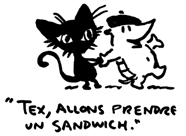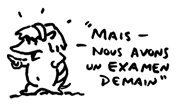Verbs
avoir expressions, ex. il y a, avoir besoin de, etc.
Avoir is used in the impersonal expression il y a, which means either ‘there is’ or ‘there are.’ Il y a is used to express the existence of a person or a thing, or to make a list or inventory of persons or things. The indefinite article (un, une, des) is usually used with il y a.
| Tex: A Paris il y a une tour, la Tour Eiffel. | Tex: In Paris there is a tower, the Eiffel Tower. | |
| En France il y a des cathédrales, des châteaux, des monuments anciens … | In France there are cathedrals, castles, ancient monuments … |
The negative of il y a is il n’y a pas. The indefinite article (un une, des) becomes de or d’ after this negative expression. This corresponds to the English word ‘any.’
| Tex: Au Texas il n’y a pas de cathédrales, il n’y a pas de châteaux, il n’y a pas de monuments anciens, | Tex: In Texas, there aren’t any cathedrals, there aren’t any castles, there aren’t any ancient monuments, | |
| Tammy: Mais il y a une tour à l’Université du Texas à Austin. | Tammy: But there is a tower at the University of Texas at Austin! |
Avoir is used in many idiomatic expressions. Note that the English translation often uses the verb ‘to be’ rather than ‘to have.’
| avoir besoin de | to need | |
| avoir envie de | to want (to do something), to feel like (doing something) | |
| avoir l’intention de | to intend to (do something) | |
| avoir faim | to be hungry | |
| avoir soif | to be thirsty | |
| avoir chaud | to be hot | |
| avoir froid | to be cold | |
| avoir honte (de) | to be ashamed (of) | |
| avoir mal (à la tête, à la gorge, aux yeux) | to hurt (to have a headache, to have a sore throat, to have sore eyes) | |
| avoir raison | to be right | |
| avoir tort | to be wrong | |
| avoir sommeil | to be sleepy |
| Bette: Tex, j’ai faim. | Bette: Tex, I’m hungry. | |
| Tex: Il y a un café à côté. Allons prendre un sandwich. | Tex: There’s a café next door. Let’s go have a sandwich. | |
| Tammy: Mais, Tex. Bette et moi, nous avons un examen demain. J’ai envie de vous accompagner, mais nous avons besoin d‘étudier. En plus, j’ai toujours froid dans ce café. | Tammy: But, Tex. Bette and I have a test tomorrow. I’d like to go with you, but we need to study. AND, I’m always cold in that cafe. | |
| Bette: Tu as raison,Tammy. Toi, tu as besoin d’étudier, mais pas moi. J’ai l’intention de manger. Ciao. Miau. | Bette: You’re, right, Tammy. You do need to study, but not me. I intend to eat. Ciao. Meow. |



